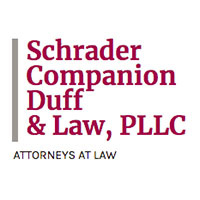New Cumberland Estate Lawyer, West Virginia
Sponsored Law Firm
-
 x
x

Click For More Info:
-
Schrader Companion Duff & Law, PLLC.
401 Main Street Wheeling, WV 26003» view mapAccident & Injury Law Knowledge, Integrity, Results
At Schrader Companion Duff & Law, PLLC., we are well aware of your rights, and are dedicated to getting you the compensation you and your loved ones deserve.
800-939-8771
Sandra K. Law
✓ VERIFIEDEmployment, Accident & Injury, Estate, Workers' Compensation, Divorce & Family Law
Schrader Companion Duff & Law, PLLC., has a distinguished history of providing exceptional legal services for almost a century to clients in litigatio... (more)
Joseph Lee Ludovici
Wills, Employee Rights, Criminal, Accident & Injury, Power of Attorney
Status: In Good Standing Licensed: 38 Years
Michelle Lynn Gorman
Estate Planning, Estate, Banking & Finance, Business
Status: In Good Standing Licensed: 29 Years
Michelle L. Gorman
Estate Planning, Estate, Banking & Finance, Business
Status: In Good Standing Licensed: 29 Years
Sharon Nada Bogarad
Estate Planning, Family Law, Elder Law, Medical Malpractice
Status: In Good Standing Licensed: 56 Years
Frank A. Jackson
Business Organization, Corporate, Elder Law, Estate Planning
Status: In Good Standing Licensed: 48 Years
Benjamin Michael Cox
International Tax, Estate Planning, Employee Rights, Elder Law
Status: In Good Standing
Donna Lynn Crow
Insurance, Litigation, Medical Malpractice, Estate
Status: Inactive Licensed: 35 Years
 Sandra K. Law Wheeling, WV
Sandra K. Law Wheeling, WV Practice AreasExpertise
Practice AreasExpertise

